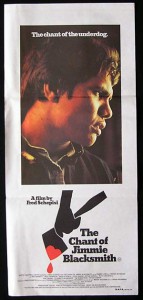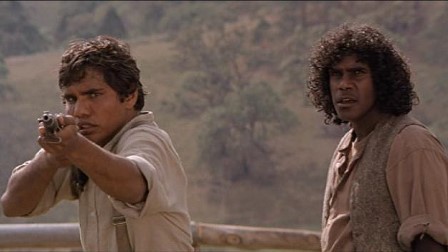Half-Caste Agit-Prop [THE CHANT OF JIMMIE BLACKSMITH]
From The Soho News (September 3, 1980). –- J.R.
The Chant of Jimmie Blacksmith
Written and directed by Fred Schepisi
Based on the novel by Thomas Keneally
For a good 80 percent or so of its running time, the experience
of seeing The Chant of Jimmie Blacksmith affords a
salutary, beautiful shock. Films that are even halfway honest
about racism — Mandingo and Richard Pryor Live in
Concert are the most recent examples that spring to mind
— are so unexpected that they’re often accused of being racist
themselves, perhaps because of the deeply rooted taboos that
they expose and violate.
There’s no question that Fred Schepisi’s powerhouse Australian
movie — adapted from a novel by Thomas Keneally (who plays a
small but significant role as a lecherous cook), and “based on real
events that took place in Australia at the turn of the century”
(just before the federation of Australian colonies) – is agit-prop,
ideologically slanted. But then again, it’s hard to think of any
other current release — including, say, The Empire Strikes
Back and Dressed to Kill -– that isn’t.
The aforementioned hits perform in part the not-so-innocent
task of turning contemporary objects of confusion and disgust
(recent architecture and sex, respectively) into occasions for
exhilarated lyricism. Read more





